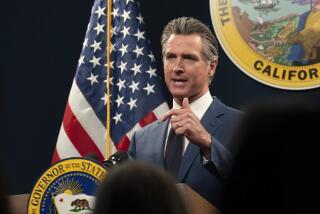Clinton Details Firearm Initiative
BOSTON — Responding to critics who say that his administration has done too little to enforce gun control laws already in place, President Clinton proposed spending $280 million Tuesday to crack down on illegal firearms and improve handgun safety.
On a visit to Boston’s Roxbury section, an area notorious for drug-related violence that has seen a marked drop in its crime rate, the president called for 500 new agents and inspectors to police gun dealers across the nation, 1,100 more prosecutors at the federal and state levels and development of new technology for so-called “smart guns” that can be fired only by their owners, not by children or thieves.
Speaking in a gymnasium packed with law enforcement officers, lawmakers and community leaders, Clinton soft-pedaled his embrace of a legislative position long espoused by congressional Republicans and the National Rifle Assn.--that the nation needs better enforcement of existing gun laws rather than restrictive new ones.
“It’s a stale debate,” Clinton said, declaring that “the real answer is we should do both.” He added that “the drop in the national crime rate has been due both to changing laws and to better enforcement and prevention.”
The president’s conservative foes seemed to welcome his new approach.
“I am pleased that President Clinton appears to be partially signing on to the Republican solution to reducing gun violence,” said Sen. Orrin G. Hatch (R-Utah), chairman of the Judiciary Committee.
“The NRA for decades has called for vigorous prosecution of criminals who violate gun laws,” NRA spokesman Jim Manown said. “We hope this proposal is serious and sincere.”
At a hearing in May, House Republicans charged that one sign of the administration’s failure to enforce gun laws was its poor record of prosecuting people who had tried to buy weapons but were rejected when crime data checks showed that they were ineligible as convicted felons.
GOP lawmakers said that there have been only a handful of prosecutions of more than 250,000 felons and others in this category and of more than 6,000 juveniles expelled from school for carrying firearms.
But Deputy Atty. Gen. Eric H. Holder Jr. told the hearing that since 1993 the number of violent crimes involving firearms has declined by 27%.
Furthering the debate, the Justice Department released statistics Tuesday showing an increase in federal gun prosecutions in 1999 over 1998. Last fiscal year, federal prosecutors brought 5,500 firearms cases against 7,057 defendants compared with 4,391 cases against 5,876 defendants in 1998--a 25% increase in firearms cases, the department said.
Atty. Gen. Janet Reno said that federal prosecutors “all over the country are vigorously enforcing the firearms laws” and are collaborating with state and local authorities.
Meanwhile, the Washington-based Coalition to Stop Gun Violence joined its conservative opponents in calling Clinton’s proposals “a huge step in the right direction.”
Desmond Riley, representing the coalition, said that the Treasury Department’s Bureau of Alcohol, Tobacco and Firearms “could do a better job of enforcement” and that the additional funding the president is requesting “will help a great deal.”
Riley added, however, that “with 100,000 gun dealers in the nation there’s really no way ATF can adequately regulate them” without additional laws.
In his speech, Clinton also called on Congress to approve his package of gun-control bills that cleared the Senate by one vote last year but died in the House. That package included background checks for people buying weapons at gun shows, child safety locks for handguns, a ban on the importation of large-capacity ammunition clips and a lifetime ban on gun ownership for violent youths.
“I believe passing common-sense gun safety legislation should be the very first action of this Congress,” the president said.
A breakdown of the administration’s $280-million proposal:
* Hiring 500 ATF agents and inspectors, which would be the largest increase in staffing ever.
* Hiring 1,100 additional federal, state and local prosecutors to work on gun-related crimes. Federal funds would pay for the local hires. The cost of this part of the package is estimated at $150 million. It would also pay for 20 new gun enforcement teams in high-crime areas around the country.
* Funding expansion of ATF’s capacity to trace guns used in crimes and to “fingerprint” bullets recovered from crime scenes. The technological expertise would aid in prosecutions nationally.
* Providing an additional $10 million for research into “smart gun” technologies, which could prevent a weapon from being fired accidentally.
* Funding anti-violence media campaigns by city and state governments.
“We know how to drive the crime rate down,” said Clinton. “I think it’s time we had a real goal . . . as a nation. Here’s our real goal: We want America to be the safest big country in the entire world.”
Alonso-Zaldivar reported from Boston and Jackson reported from Washington.
* TALKS MISFIRE: Negotiations aimed at settling anti-gun suits by major cities hit a snag. C1
More to Read
Sign up for Essential California
The most important California stories and recommendations in your inbox every morning.
You may occasionally receive promotional content from the Los Angeles Times.










